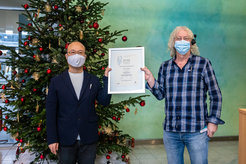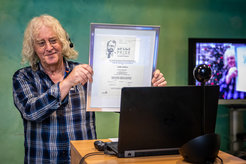Jeff Schell Prize Award Ceremony 2020 under Corona Conditions
Due to the Corona pandemic, the two prize winners received their awards and certificates at the Institute's virtual Christmas party. Dr.Takuya Yoshida gave his lecture at the institute, Anika Küken online. The employees of the institute were also connected via the Internet.

Dr. Takuya Yoshida from Japan receives the postdoctoral award for his work in the field of plant hormones, here specifically on the hormone abscisic acid (ABA).
Phytohormones are substances synthesized by plants that, even in small amounts, have a controlling effect on plant developmental and differentiation processes, including germination, growth, seed maturation, leaf shedding, flower formation, differentiation and branching.
Dr. Yoshida's research is specifically devoted to abscisic acid (ABA), a plant hormone that regulates a variety of cellular and molecular processes. Most importantly, however, it is closely related to water availability. At the organ level, dry seeds acquire desiccation tolerance via ABA. At the cellular level, ABA controls the movement of stomata, which are important for transpiration and the exchange of CO2 and O2. At the molecular level, many drought-responsive genes are regulated by ABA signaling. ABA accumulates primarily when drought stress exists in seeds or tissues. However, ABA is thought to play a role not only under stress conditions, but also under non-stress conditions. For example, ABA levels in tobacco leaves are known to fluctuate during a day-night cycle.

Dr. Yoshida's research has explored the question of whether ABA is also involved in plant growth and primary metabolism under stress-free conditions. Using Arabidopsis thaliana mutants lacking the proteins that normally regulates ABA signaling, he analyzed, the appearance (phenotype) of these mutants in terms of growth and metabolism. Dr. Yoshida found that the plants that contained less or no ABA had increased leaf number and the metabolic profile of the mutants was very different from the non-mutants that were able to produce ABA. Dr. Yoshida was able to show that the so-called TCA cycle (tricarboxylic acid cycle), which is a basic metabolic process for the production of energy and amino acids, was disrupted at lower ABA levels. The mutants provided information that they related hormone signaling to metabolism. Dr. Yoshida's work demonstrated that ABA is involved in the maintenance of primary metabolism and leaf growth even under stress-free conditions. Further research will show whether ABA also plays a key role in crops grown in irrigated fields.
The demonstration that ABA is not only a stress hormone but also has an important function for plants under non-stress conditions is groundbreaking and earned Dr. Yoshida his nomination as a Jeff Schell Award winner. Prof. Fernie describes Dr. Takuya Yoshida as: "an extremely dedicated scientist who conducts his research independently and thoughtfully and has completely redefined the role of the hormone ABA."
Personal portrait
Dr. Takuya Yoshida was born and raised in Tokyo, Japan. He first studied biology in his bachelor's degree at Tokyo University of Pharmacy and Life Sciences. He completed his master's and doctoral degrees at the University of Tokyo in applied biological chemistry. Since 2014, he has been conducting research at the Max Planck Institute for Molecular Plant Physiology in the group of Prof. Alisdair Fernie, which focuses on central metabolism.
This year's PhD student award goes to Anika Küken for her research in the field of "Systems Biology and Mathematical Modeling".

Plant metabolism is complex! Depending on developmental stage, environmental factors and genetics, different metabolites are permanently built up, degraded, and transformed within the plant and transported from places of origin to places of demand. Researchers want to understand this dynamic network in order to gain new insights into biological functions and make predictions about plant properties. To get closer to this goal, scientists collect huge data sets on metabolites, their concentrations and their temporal evolution to develop models that allow the prediction of developments by simulating and analyzing metabolic fluxes, among other things. Despite improvements in such modeling approaches, it remains difficult to make predictions about metabolite concentrations. In the publication for which Anika Küken has now been honored, a new computational approach for deriving such concentration ranges from metabolic models is presented. The results specify a molecular mechanism that allows easy control of the concentration ranges of components in large metabolic networks. The approach presented in the excellent work represents an important step in extending the applicability of large-scale metabolic models to a range of biotechnological and medical applications.
In his nomination letter for the award, Prof. Nikoloski highlights, "As part of her PhD research, Anika contributed to the publication of eight articles, including two reviews and six research articles that appeared in leading journals in the field of computational biology and plant biology, including Nature Communications, eLife, PLoS Computational Biology, and Plant Physiology. The basis for her nomination is the research article "Cellular determinants of metabolite concentration ranges," which was published in PLoS Computational Biology and resulted in a recently approved patent. Prof. Nikoloski further praises his former doctoral student as a strong, independent scientist. "I am convinced that Anika Küken is on her way to achieving great success in computational biology," Prof. Nikoloski said.
Personal portrait

Anika Küken was born in Potsdam and raised nearby in Werder (Havel), Germany. She completed her bachelor's degree at Humboldt University in Berlin and her master's degree at the University of Potsdam. Since her doctoral degree, she works as a postdoc at the University of Potsdam in the Bioinformatics Group at the Institute of Biochemistry and Biology. Her doctoral thesis, which resulted in the publication for which Anika Küken has now received the Jeff Schell Award, was written in the research group of Prof. Zoran Nikoloski. Prof. Nikoloski heads the Bioinformatics Group at the University of Potsdam, but has a cooperative research group on "Systems Biology and Mathematical Modeling" at the Max Planck Institute of Molecular Plant Physiology.
The awards bestowed on the two scientists were made possible by a generous donation from BASF.



